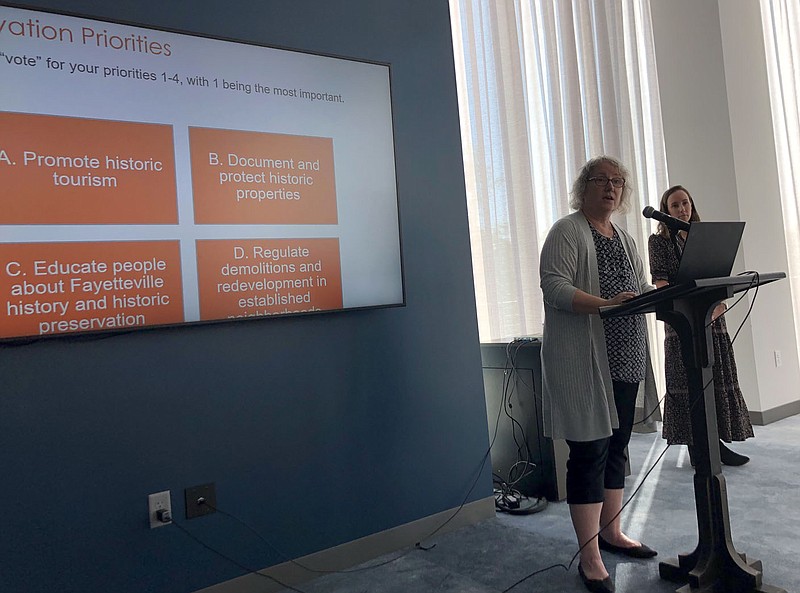FAYETTEVILLE -- Community input will guide the city's heritage and historic preservation efforts over the next decade, according to the consultants hired to come up with a plan.
The first public input session to shape a citywide heritage and historic preservation plan was held Wednesday at the Fayetteville Public Library. About a dozen people attended in person, with another dozen or so attending online via Zoom.
Consultants Steph McDougal, with McDoux Preservation in Houston, Texas, and Emily Reed with Stantec Consulting Services in Austin, Texas, outlined the next steps and processes to develop the plan. The City Council hired the consultants in August using a $50,000 grant from the Arkansas Historic Preservation Program and $20,000 in city money.
The city's first formal plan will explore the full spectrum of what the city could do in regard to historic preservation and what residents want to see happen, McDougal said.
"This is going to be driven by what the community tells us they want -- what you want," she said. "We're not coming in to tell you what we think should happen, we're just providing information about what you might choose to do."
For example, the consultants may recommend the city adopt regulations to address certain issues, but it'll be up to the city to write the ordinance, McDougal said. The plan will lay the foundation for work over the next 10 years, she said.
Among the consultants' tasks are examining existing neighborhoods and historical assets, evaluating past preservation efforts and identifying places with the most historical significance. Significance, in the context of the plan, means places or structures that qualify for placement on the National Register of Historical Places or local designation for a landmark or historical district, McDougal said.
Part of the plan will involve prioritizing historical resources for preservation, she said. The consultants will outline strategies and recommend a series of best practices.
The consultants will offer more opportunities for the public to provide feedback, including a survey that will be posted soon to the city's Speak Up website, McDougal said.
Participants were asked to place stickers labeled 1 through 4 on boards to prioritize four directions for the plan.
Educating people about the city's history and historic preservation was the top vote-getter. Documenting and protecting historic properties received the most second votes. Regulating demolitions and redevelopment in neighborhoods received enough votes for No. 3. The last priority was promoting historic tourism.
The consultants took questions from the participants for about 40 minutes. Sharon Killian asked how the plan would address gentrification impacting Black neighborhoods and historic places. Gentrification refers to the displacement of low- to moderate-income residents by wealthier residents, investors and businesses moving in. Many structures and places in the city have meaning for Black residents but have not been formally recognized and are dwindling in number, Killian said.
McDougal said development, segregation and various forms of discrimination historically have made it difficult for Black residents to own property, preserve it and not be forced out of their own neighborhoods. Black neighborhoods historically have been under-appraised, making them targets for redevelopment, McDougal said.
"I know development is rampant. Can we move fast enough? I don't know," she said. "But I know we're moving as fast as we can with this plan, and we're certainly going to be giving attention to that very specific issue."
The process to develop the plan is scheduled to take a year. A draft plan should be ready for the public to comment on by end of winter, with revisions made in spring. A final plan is scheduled to be ready for the City Council to adopt next summer.
More News
NoneOn the web
For more information on Fayetteville’s heritage and historic preservation plan, go to:
https://bit.ly/faypreservationplan
